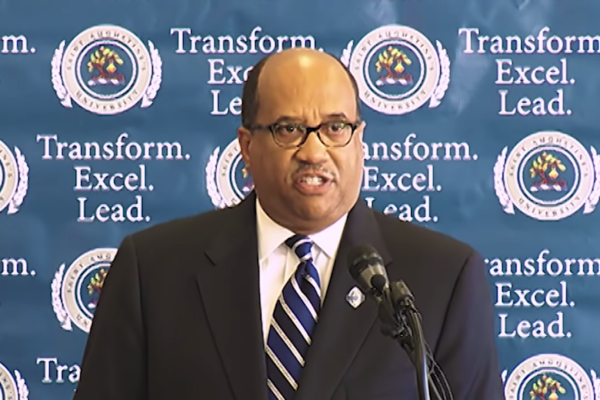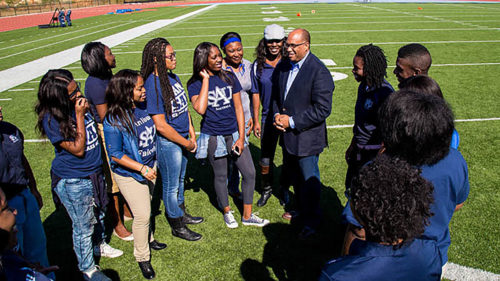Episcopal Church’s support for historically black universities cited in Saint Augustine’s turnaroundPosted Dec 13, 2018 |
|

Saint Augustine’s University President Everett Ward speaks Dec. 11 at a news conference to announce the university has received a 10-year accreditation. Photo: Saint Augustine’s, via YouTube
[Episcopal News Service] The Episcopal Church’s longtime support for historically black colleges and universities was credited this week in a major success story in Raleigh, North Carolina. Saint Augustine’s University, a school the church helped establish more than 150 years ago, announced that its accrediting agency had taken the institution off probation, indicating that it finally had turned the corner on its financial struggles and enrollment decline.
Saint Augustine’s President Everett Ward sounded euphoric at a press conference Dec. 11 to present the good news.
“By God’s grace, I am here today and can report to you that we have saved Saint Augustine’s University,” Ward said, according to the News & Observer. In a subsequent press release, Ward touted a “turnaround strategy” that drew support from alumni, faculty students and community partners.
“I would like to especially highlight and thank the Episcopal Church for its unwavering support,” Ward said in the press release. “From Presiding Bishop Michael Curry’s letters and encouragement, to the church’s HBCU committee and their consultants’ foundational, administrative, and advisory support, and to all who offered gifts of prayer as well as financial contributions.”
The Episcopal Church at one point supported 11 HBCUs in Louisiana, Mississippi, North Carolina, South Carolina, Tennessee, Texas and Virginia. By 1976, only three remained, and in 2013, one of those three, Saint Paul’s College in Lawrenceville, Virginia, also folded.
The two survivors are Saint Augustine’s and the much smaller Voorhees College in Denmark, South Carolina. The Episcopal Church has invested millions of dollars in the two schools in recent years while also providing administrative guidance and fundraising support. Voorhees’ accreditation was not in doubt, but in 2016, the Southern Association of Colleges and Schools’ accrediting board placed Saint Augustine’s on probation because of concerns about its financial security.
When the board met last weekend, the stakes were high for Saint Augustine’s. Losing accreditation could have dealt a devastating and potentially fatal blow to the school. Instead, the board decided to renew Saint Augustine’s accreditation for 10 years.
“It’s really a wonderful time, not only for Saint Aug’s, but the church can be very proud that one of its institutions will continue to provide quality education for students and support for their families and continue to exist for the years to come,” the Rev. Martini Shaw told Episcopal News Service by phone after the announcement.
[perfectpullquote align=”right” bordertop=”false” cite=”” link=”” color=”” class=”” size=””]To donate in support of Saint Augustine’s University visit www.episcopalchurch.org/givesau, text GIVESAU to 41444 or mail your contribution to The Appeal for Saint Augustine’s University, c/o The Episcopal Church Office of Development, 815 Second Avenue, New York, NY 10017 (note Saint Augustine’s University in the check memo).[/perfectpullquote]
Shaw, who is rector at the African Episcopal Church of St. Thomas in Philadelphia, serves as chair of the HBCU committee of the Episcopal Church’s Executive Council. The council established the HBCU committee in 2017 to continue work begun by an HBCU task force that formed in 2015.
The church’s recent work with HBCUs coincides with an emphasis on racial reconciliation under Curry’s leadership, though Episcopal ties to these academic institutions dates back further to the post-Civil War period. Colleges and universities like Saint Augustine’s and Voorhees were founded to provide educational opportunities to black men and women who were excluded from white institutions of higher learning because of segregation.
Saint Augustine’s was established in 1867 by the Episcopal Church and opened its doors the following January. The school that later would become Voorhees College was founded in 1897, and the Episcopal Church has supported it since 1924.
About 100 such schools are still open today across the United States, accepting students of all races, and some of the financial and enrollment challenges faced by Saint Augustine’s and Voorhees are common among other historically black colleges and universities.
The demographics of those colleges’ student bodies are changing as well. Pew Research Center reported last year that less than 9 percent of black students attended a historically black college in 2015, down from 17 percent in 1980. Over the same period, historically black colleges and universities have become more racially diverse, with the number of students who aren’t black rising from 13 to 17 percent.
Overall enrollment at HBCUs also has been in decline since hitting a peak in 2010, when 327,000 students attended one of the colleges, according to the federal government’s National Center for Education Statistics.
The agency’s Digest of Education Statistics shows that Voorhees increased its fall enrollment that year, to 752 students, but Saint Augustine’s was already beginning its downward trend, falling from the 1,529 students it had enrolled in 2009 to 1,508 students.
The decline at Saint Augustine’s gained speed in the first half of this decade, with enrollment dropping to just 810 students by fall 2015. Ward was named president that year, after taking the reins as interim president a year earlier.
In 2016, Saint Augustine’s logged its first enrollment increase in seven years, welcoming 944 students that fall. The number grew to 974 in 2017 but dropped sharply to 767 this fall, which the university blames on a negative article on HBCUDigest.com suggesting the university was near closure. By easing the uncertainty around its accreditation, Ward and other university officials see further opportunities to expand enrollment and academic programs.

Everett Ward became the 11th president of Saint Augustine’s University in Raleigh, North Carolina, in April 2015. Photo: Saint Augustine’s University
“The relevancy of any intellectual community has got to be that you grow and advance with the changing society, because we’re producing the leaders of society here at Saint Augustine’s and subsequently you have to embrace diversity,” Ward, a graduate of Saint Augustine’s, told ENS in 2017 for a Q&A during the university’s 150th anniversary year.
The Episcopal Church’s financial support has helped stabilize the two schools and, in Saint Augustine’s case, bring it back from the brink of losing accreditation. General Convention has approved about $2 million to support HBCUs with Episcopal ties for the past several triennia. After Saint Paul’s closed in 2013, the money was split between the remaining two colleges.
The 2016-2018 budget included $1.1 million for each college, and the same amount has been approved in the 2019-2021 budget. Separately, the church’s Development Office has worked to increase awareness of the schools within the church and to help with fundraising.
Saint Augustine’s also points to improved internal controls and an increase in alumni giving in allowing the institution to end its 2018 financial year with a surplus. As they build on these successes, university officials will continue to have the support of the Episcopal Church.
“We as the church are going to continue to work very closely with them to assure that they succeed,” Shaw said. “We don’t want to lose another one of our Episcopal schools.”
– David Paulsen is an editor and reporter for the Episcopal News Service. He can be reached at dpaulsen@episcopalchurch.org.

Social Menu